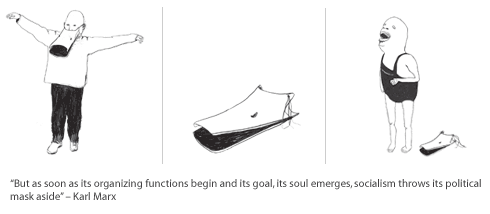Critique of political organisation: An introduction
In our last issue we tried to start localising ourselves – for us, and for our readers – with the help of the concept of ‘practical reflexivity’. With our seventh issue, we have set out to continue this effort of localisation – why we have called this issue’s theme ‘Critique of political organisation’.
|

|
Wildcat: Reforming the welfare state for saving capitalism: The ‘guaranteed income’ and new reformist illusions
While the capitalist state wants to motivate more people to do badly paid and casual work, some groups from the left claim to campaign against capitalism by demanding a ‘guaranteed income’. But do the friends of the ‘guaranteed income’ really grasp what's going on?
|

|
Democracy as the community of capital: A provisional critique of democracy
The force in society with power to blast capital to pieces is not the establishment of democratic electoral and decision mechanisms in production, no matter if it feeds or strangles capital, but the refusal of the proletariat, in its rudimentary and more developed forms.
|

|
Amadeo Bordiga: Seize power or seize the factory?
We would not like the working masses to get hold of the idea that all they need do to take over the factories and get rid or the capitalists is set up councils. This would indeed be a dangerous illusion.
|

|
Giacomo Marramao: Theory of crisis and the problem of constitution
It is still widely held that the theory of the crisis and collapse of the capitalist system is inherited from the positivist deformation of the ‘Marxism of the Second International,’ and that it thus implies ideological support for reformist politics.
|

|

|

|
Communism of attack, and communism of withdrawal
The aim with this essay … was initially to define communisation and the communist movement, and to explain why we saw communism as identical to the antagonist relation of the proletariat to capital. Thus the initial thought was to investigate what Antonio Negri and Michael Hardt, in Empire, call ‘the will to resist’. However, during the course of writing, this changed, because, while we were working with the essay our perspectives radically developed. We fundamentally abandoned the mythology of Marxism about the proletariat, which in its turn led us to criticise that part of our dialectics that states that communism is the result of an internal contradiction to the relations of capital.
A proper English version will hopefully come one day. In the meantime, here is a rough translation (pdf).
|

|
Correspondence between parts of the riff-raff-collective and Gilles Dauvé
First, real and formal domination. When did the real one start? After 1918? after 1945? after the 1960s and 70s? If I understand people like TC, real domination (and all it entails: the end of the workers’ movement and the end of a possible worker led capitalism) was only born around 1980. Is that what Marx meant in his unpublished VIth chapter of Capital volume I and in Grundrisse?
|

|
J. Kellstadt: The Necessity and Impossibility of Anti-Activism
Perhaps the first steps towards a genuine anti-activism would be to turn towards these specific, everyday, ongoing struggles. How are the so-called ‘ordinary’ workers resisting capitalism at this time? What opportunities are already there in their concrete struggles? Having a perspective which recognises this and even orients towards it requires a theory to go with one’s practice, a theory that can think the ‘subjective’ and ‘objective’ simultaneously, seeing them in all their mutually-conditioning relatedness.
|

|
|
Marx/Engels series
|

|
Karl Marx: Critical notes on the article ‘The king of Prussia and social reform. By a Prussian’
Every revolution dissolves the old order of society; to that extent it is social. Every revolution brings down the old ruling power; to that extent it is political.
|

|